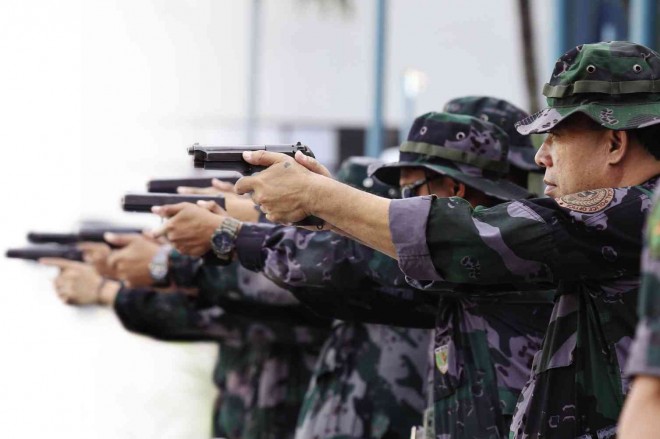
POLICE officers take part in a training program designed to secure delegates to the Apec meetings in Cebu. JUNJIE MENDOZA/CEBU DAILY NEWS
TAXI driver Wilfredo Baron is excited for the arrival of some 3,000 delegates who will attend the Asia-Pacific Economic Cooperation (Apec) meetings here that will start on Saturday.
He sees two benefits from the Apec meetings—a chance to earn more and apply what he learned from a seminar given by the Department of Tourism (DOT) in Central Visayas.
“I am even willing to bring them to the tourist spots in Cebu and places where they can eat good food. If they want, I will eat with them,” said Baron, 35, a taxi driver for 10 years.
He said international conferences, like Apec, give taxi drivers like him a chance to earn more, mainly from tips from delegates.
At least 400 drivers were taught basic English and how to entertain foreign passengers, in case their passenger happened to be an Apec delegate.
“Good morning sir. How are you today? Where do you want to go?” will be the standard greetings of taxi drivers to foreign customers.
If the passenger doesn’t know where to go or which tourist spot to visit, the drivers can give suggestions.
The DOT gave the drivers maps of Cebu with basic information and trivia about some of the province’s most famous tourist sites.
The drivers are expected to memorize these pieces of information to share with their foreign passengers.
They are, however, discouraged from bringing the delegates to prostitution dens in Cebu.
Apec delegates started arriving on Thursday although their advance parties came a day ahead.
“Delegates will not come in one wave,” said Lito Maderazo, Apec local organizing committee coordinator.
There are at least six Apec meetings that will start Saturday. At least 90 other meetings will be held Aug. 23 to Sept. 11.
During the meetings, routes designated for Apec in the cities of Lapu-Lapu, Mandaue, and Cebu will be cleared of vehicles at certain times of the day to allow delegates’ convoys to pass unobstructed.
Police in Cebu have been placed on heightened alert since Tuesday but Cebuanos can expect high police visibility during the Apec meetings.
At least 4,000 policemen serve as security forces and are deployed to Apec venues, hotels, resorts and tourism sites.
A truck ban is in place on Juan Luna to Salinas Drive, Salinas Drive to Cebu Veterans Drive and corner Archbishop Reyes to Gorordo Avenue in Cebu City from 6 a.m. to 10 p.m. starting Aug. 22 to Sept. 5. At a dry run, traffic was horrendous.
Travel from Shangri-La’s Mactan Resort and Spa to Marco Polo Plaza Cebu took 31 minutes at a speed of 40 to 60 kilometers per hour.
During the meetings, public utility vehicles plying Juan Luna Avenue in Cebu City to the three Apec venues are diverted to nearby roads to ensure uninterrupted travel of the delegates, said Joy Tumulak, Cebu City Traffic Office (CCTO) operations head.
Rafael Yap, also of CCTO, said road closures will be a “last resort because it is very disruptive.”
CCTO’s 200 personnel will not be allowed to take their day off or go on leave. They are also required to render nine hours of service per day.
Rowena Montecillo, DOT Central Visayas director, said tours to Cebu’s historic spots are being organized for Apec delegates and their families. She declined to reveal the tours’ schedules. Judilyn Quiachon, DOT regional senior tourism operations officer, said the Cebu City tour will include the Basilica Minore del Sto. Niño, Magellan’s Cross and Fort San Pedro.
The Department of Health (DOH) in Central Visayas is also coordinating with health offices in the cities of Lapu-Lapu, Mandaue and Cebu to prevent cases of food poisoning.
Reynan Cimafranca, head of the Regional Epidemiology and Surveillance Unit of the regional DOH office, said four Apec hotels and restaurants have been inspected.
Stickers bearing the DOH logo are posted on doors of restaurants and establishments that passed the sanitary and safety inspections.
“We do not want any of our guests to end up with upset stomach,” he said. With Carine Asutilla-Lapid, Inquirer Visayas

